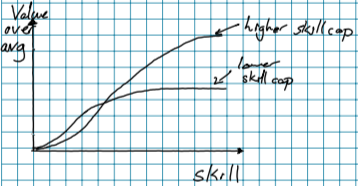EDIT: I'm only going to answer a few more questions, due to time constraints. I might eventually come back and answer more. I still appreciate getting replies with people's thoughts on things I've written.
I'm going to do an AMA on Tuesday next week (November 19th). Below I've written a brief description of what I'm doing at the moment. Ask any questions you like; I'll respond to as many as I can on Tuesday.
Although I'm eager to discuss MIRI-related things in this AMA, my replies will represent my own views rather than MIRI's, and as a rule I won't be running my answers by anyone else at MIRI. Think of it as a relatively candid and informal Q&A session, rather than anything polished or definitive.
----
I'm a researcher at MIRI. At MIRI I divide my time roughly equally between technical work and recruitment/outreach work.
On the recruitment/outreach side, I do things like the following:
- For the AI Risk for Computer Scientists workshops (which are slightly badly named; we accept some technical people who aren't computer scientists), I handle the intake of participants, and also teach classes and lead discussions on AI risk at the workshops.
- I do most of the technical interviewing for engineering roles at MIRI.
- I manage the AI Safety Retraining Program, in which MIRI gives grants to people to study ML for three months with the goal of making it easier for them to transition into working on AI safety.
- I sometimes do weird things like going on a Slate Star Codex roadtrip, where I led a group of EAs as we travelled along the East Coast going to Slate Star Codex meetups and visiting EA groups for five days.
On the technical side, I mostly work on some of our nondisclosed-by-default technical research; this involves thinking about various kinds of math and implementing things related to the math. Because the work isn't public, there are many questions about it that I can't answer. But this is my problem, not yours; feel free to ask whatever questions you like and I'll take responsibility for choosing to answer or not.
----
Here are some things I've been thinking about recently:
- I think that the field of AI safety is growing in an awkward way. Lots of people are trying to work on it, and many of these people have pretty different pictures of what the problem is and how we should try to work on it. How should we handle this? How should you try to work in a field when at least half the "experts" are going to think that your research direction is misguided?
- The AIRCS workshops that I'm involved with contain a variety of material which attempts to help participants think about the world more effectively. I have thoughts about what's useful and not useful about rationality training.
- I have various crazy ideas about EA outreach. I think the SSC roadtrip was good; I think some EAs who work at EA orgs should consider doing "residencies" in cities without much fulltime EA presence, where they mostly do their normal job but also talk to people.


I would agree that, with these two principles as written, more people would agree with the first. (And certainly believe you that that's right in your case.)
But I feel like the second doesn't quite capture what I had in mind regarding the DMTW intuition applied to P_'s.
Consider an alternate version:
Or alternatively:
It seems to me that these two claims are naively intuitive on their face, in roughly the same way that the "... then taking that decision is not rational." version is. And it's only after you've considered prisoners' dilemmas or Newcomb's paradox, etc. that you realize that good policy (or being a rational agent) actually diverges from what's rational in the moment.
(But maybe others would disagree on how intuitive these versions are.)
EDIT: And to spell out my argument a bit more: if several alternate formulations of a principle are each intuitively appealing, and it turns out that whether some claim (e.g. R_CDT is true) is consistent with the principle comes down to the precise formulation used, then it's not quite fair to say that the principle fully endorses the claim and that the claim is not counter-intuitive from the perspective of the original intuition.
Of course, this argument is moot if it's true that the original DMTW intuition was always about rational in-the-moment action, and never about policies or actors. And maybe that's the case? But I think it's a little more ambiguous with the "... is not good policy" or "a rational person would not..." versions than with the "Don't commit to a policy..." version.
EDIT2: Does what I'm trying to say make sense? (I felt like I was struggling a bit to express myself in this comment.)